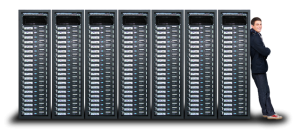Hack attacks are getting increasingly dangerous for computer systems, both in a home setting or in a company environment. Hackers are always on the look out for weak points or shortcomings in the security protocols of the network and take advantage of them. The risks are multiple and can damage the integrity of your organization in the long term. The possible damages may include confidential documents leaks or attacks on databases, but also a complete destruction of the entire network.

While some hackers merely attack computer networks out of a vicarious pleasure or joy, the more dangerous ones do it for money and can be part of large hacking organizations that may render entire computer networks useless. Regardless of their reasons and motivations, hackers are considered modern-day pirates and they can affect any company or organization. Their activity can bring down computer networks in banks, large-scale corporations, public institutions, security companies and retail businesses.
Protecting your company or organization against hack attacks is critical in this modern age, because many of your documents and important files are stored in a digital environment. Here is a list of the most effective information security procedures that will protect you:
1. Don’t use default passwords
Most software have pre-installed passwords as the default. Although some of them are, at least at first glance, quite complex and effective, they can be extremely detrimental to your network’s safety. Whenever you install new software, regardless of its importance, create a new and unique password of at least eight characters. It should include numbers and special characters, as well as simple letters. If you already use default passwords, change them as soon as possible on all workstations. Also, remember to not communicate the respective passwords to anyone who is not an integral part of the company.
2. Determine the entry points of your internal network
Every internal network has at least one entry point through which Internet access is provided. Every entry point must be identified, scanned and monitored at all times by specialized software. This is crucial because any external hack attack will go through these entry points. Depending on the complexity and size of the network, this procedure will be more time-consuming and delicate. Large scale networks have tens of entry points and, with the advent of mobile internet solutions, this procedure has become very complex and demanding. Every employee with a smartphone can be used as an entry point in the network, so pay particular attention to foreign objects that may connect to your Wi-Fi network.
3. Configure the firewall settings
Firewalls protect your databases by “checking” every new visitor that comes to your network. They help you set and enforce specific rules for new members and will allow or stop a certain type of external traffic. Essentially, a firewall acts as like access control system for doors. Remember to periodically set and check your security configurations for the firewall system. Also, a good firewall system will help you analyze the type of traffic that you receive, helping you create a long-term security action plan.
4. Install anti-virus software
Anti-virus software is used by everyone who wants a better protection against hack attacks. There are endless anti-virus software products on the market, and most of them are good. However, your primary responsibility is to make sure that they are always up-to-date and active, in order to protect your network against all possible threats.
5. Train your employees and colleagues with the help of user-awareness campaigns
You must make sure that all the members of your company or organization know the exact security protocols. A simple guide, coupled with network security conferences will help you minimize risks. For larger companies, social engineering tests done by third party companies tests are particularly useful, as they can train and educate your employees in every aspect of network security.
About the Author :
The writer, Flaviu Mircea, is a tech blogger specializing in information security and internet technology. He shares his knowledge and hopes that his writings will create a safer and more secure future for everybody. To add to your security, he recommends using alternatives to e-mail such as online faxing, and recommends comparing the myriad of online fax service providers by visiting www.findafax.com. You can learn more about Flaviu on Google+.






